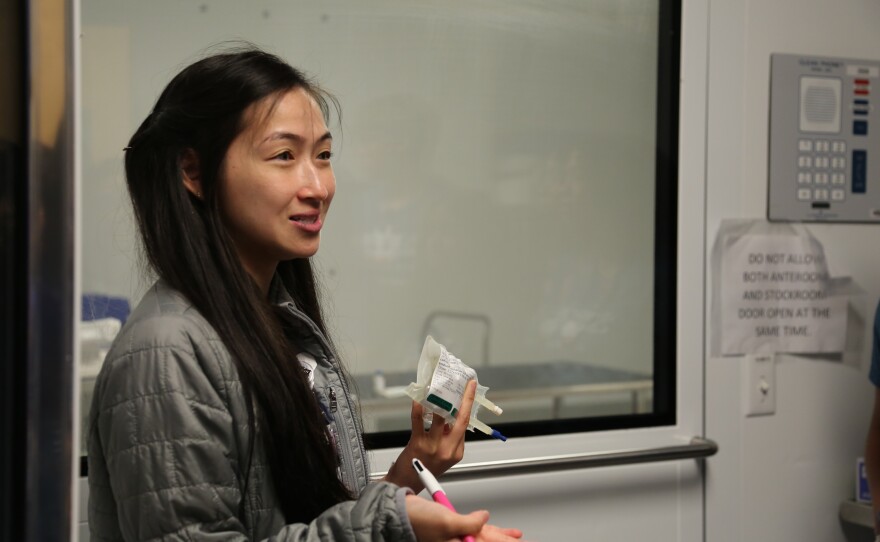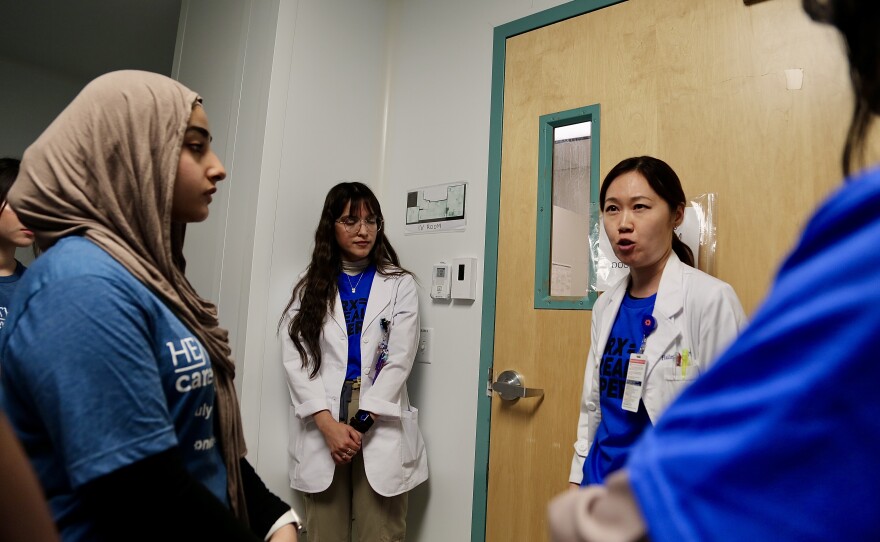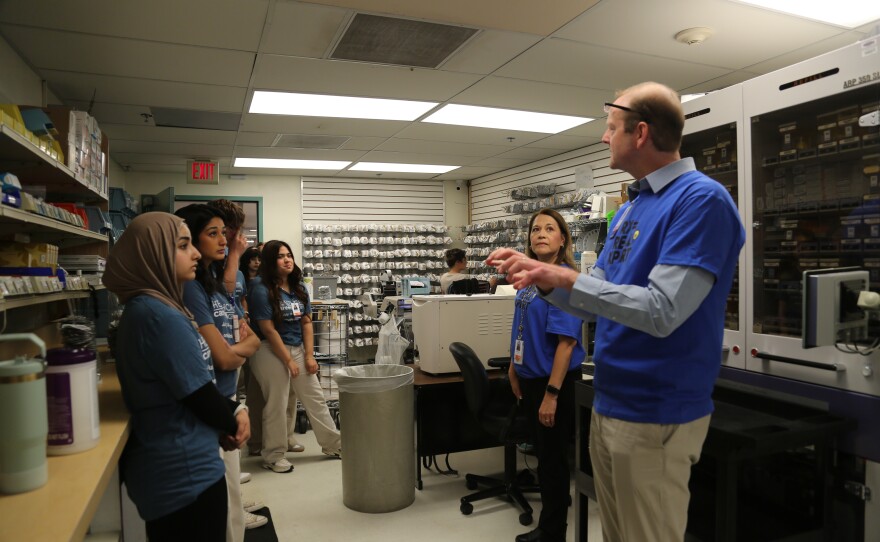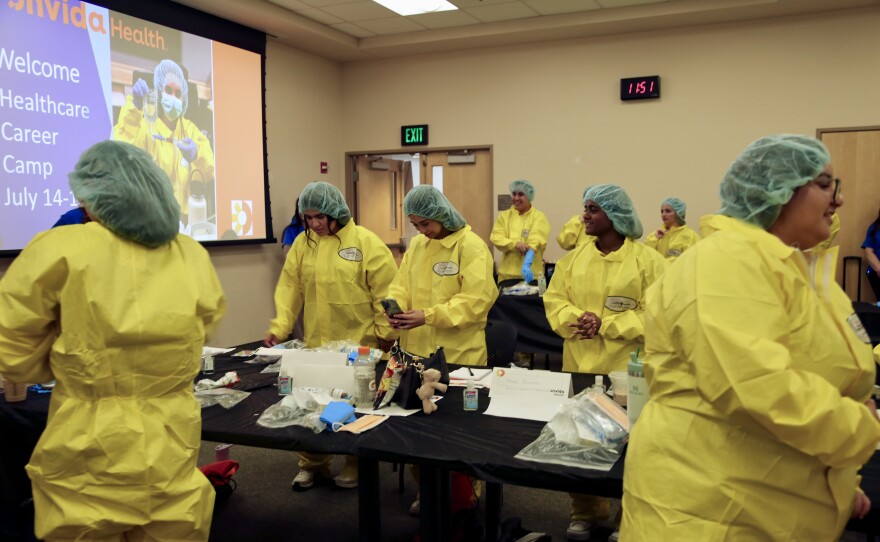Sisko Stargazer (KAWC): I'm Sisko Stargazer for KAWC News. Onvida Health’s Volunteer Services Department also hosted their annual Healthcare Career Camp this week. Forty high school and college student volunteers spent five days immersing themselves in a wide variety of educational activities. Students learned about labor and delivery, cardiovascular and pulmonary services, pharmacy medicine, surgery, radiology and ultrasound, and emergency medical services among other things.
We dropped in on day two of the camp when campers got to learn about the “‘RX-cellent’ Doctors in the Pharmacy.” Students got a behind-the-scenes look at the hospital’s pharmacy and participated in a simulation compounding IVs. They heard from various pharmacists, technicians and pharmacy residents as well as Onvida’s administrative director of pharmacy himself, Mark Jordan.
Mark Jordan (Onvida): Give you an idea in a day. How many times do we in this hospital give people medicine?
Camper: Thousands.
Jordan: Thousands? That's–there's lots of thousands. Give you a closer, bigger number. A more precise number.
Other camper: 5,000.
Jordan: Perfect. 5,000 times a day we're giving people medicine in this hospital. How many, how many of you know someone that's been in the hospital or have been here?
(Many campers raise their hands)
Jordan: Just about everybody knows someone. That's 5,000 times a day we give people medicine: either in their mouth, via parenteral injection–something that you guys are going to kind of mess with a little bit later–sometimes in less favorable ways, but we're giving people medication all the time.
(Campers and staff laugh)
Jordan: I'm being honest! Sometimes medication goes places where you wouldn't think it needed to go. But 5,000 times a day we get a chance to help people with medicine.
Stargazer: Volunteer Services Director Elizabeth Hammonds shared a little bit more about the kinds of students who attend the camp.
Hammonds (Onvida): Currently we have 260 volunteers and out of that 260, we invited 140 to apply. And out of that number, 40 completed all our requirements, and so we're very fortunate to have 40 bright students. And again, these are high school and college students.
They are so smart, so bright, and they are, they want to learn. They just want to soak everything up and really make those wise decisions, and so they want to know 'What courses do I take? What classes?' Everything to be able, again, to make that decision as to what is the career look like, their lifetime career?
Stargazer: According to Hammonds, the interactivity's what really appeals to campers.
Hammonds: But at the end of the day, it's the interactions, and the just, being engaged; well, how engaged they are with all the staff, and they really enjoyed that. Labor and delivery. They really enjoyed the NICU, which is the neonatal intensive care unit. And so being able to see our tiniest–of course, not real–but the tiniest of patients that we have here at the hospital. And to be able to, you know, how, how is a patient that small treated? So it really comes down to just those interactions and the staff and volunteer engagement.
Stargazer: An important element to planning the camp each year are camp facilitators. These are volunteers who provide insights about what they’d like to learn and find interesting. One of these facilitators, Emily Espinoza, is a Cibola high schooler who’s passionate about volunteering and learning new things. Emily wants to work in healthcare someday, but she’s still figuring out the direction she wants to take. Already, the camp has given her new ideas.
Espinoza (volunteer/camp facilitator): Right now I'm more interested in, I would say kind of like a surgical tech and like it like influenced more yesterday, which we had like actual surgeons, like, come in and like explain to us their career paths, especially surgical tech, which is like the main one. And I was like, 'oh, wow, that's really interesting.' Because every time you go in, it's like you see an impact right away after you do the procedure, and that's something I want to see because surgery is, like, a difficult thing to do and which I admire since it takes a long time. But like in the end, it's like very beneficial.
Stargazer: Emily’s already learning a lot, too, from her regular volunteering.
Espinoza: For example, in my position, I started off at the Corner Stork, which is a retail place, and now I am moved into a new area which is called patient engagement at the emergency department. And in that department specifically, you're able to interact with different patients from teenagers or like from babies to adults, basically. So I'm able to interact with each age group, which also helps me, like, in the aspect of patient interactions which will also help me later on with my profession.
Stargazer: Emily’s biggest message, however, is that volunteering is really the way to go.
Espinoza: I think volunteering is a really good way to spend your time, especially, like, in your high school years when you're, like, determining, ‘Do I really want to go into health care? Is this something that I want to do?’ And in knowing that this is here, there's so many other positions. There's labor and delivery, there's patient engagement, that emergency department, as I mentioned earlier.
Maybe you're not so into, like, patient experience. But volunteering here is, like, it's not only about healthcare, right? There's, like, other things you could do here as well in which you can, like, expand your knowledge. Like for example, like, in the hospital, you're able to be in retail or you're able to be actually engaging with nurses, doctors, different specialties in the area.
And now for, like, the camp: the camp has various specialties in which you probably didn't know about or it's things you knew about but you didn't really understand. And then having actual, like, people who work in that area in which you can ask questions about can fill that void that you used to have. But now you can, like, 'Okay, I know this about this and that happens because of this' and things like that.
Stargazer: Director Hammonds told us there’s currently a waitlist to volunteer.
Hammonds: So we're asking them, anyone that may be interested to email us with their name, their email, a cell phone so we can reach out once we open up the applications once again to be able to allow people to apply.
Stargazer: Openings may be coming up soon so email volunteerservices@onvidahealth.org if you’re interested. As a quick note, Onvida Health is a supporter of KAWC. I'm Sisko Stargazer and this reporting's supported by a grant from the Arizona Local News Foundation.
This reporting is supported by a grant from the Arizona Local News Foundation.




















